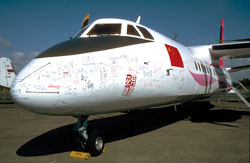 A controversial Chinese aircraft deal originally pushed by the Nepal Army and the palace is stuck in cabinet, as the new government comes under pressure from Beijing not to cancel the order.
A controversial Chinese aircraft deal originally pushed by the Nepal Army and the palace is stuck in cabinet, as the new government comes under pressure from Beijing not to cancel the order.
If the deal goes ahead, several sources say, Nepali taxpayers will end up paying $8 million more than the cost price for aircraft that are unsuitable and unnecessary. The extra money will most likely line the pockets of top palace and army officials, they add.
A cabinet decision approving the purchase of two Chinese MA-60 turboprops was slated for Monday, but deferred indefinitely. A government source told us the cabinet will take a decision on the matter "after all the relevant information comes in".
The deal is now seen as a measure of the capacity of the seven-party government to stand up to pressure not just from the Chinese but also from powerful figures from the royal past.
The controversy is in part about whether the craft, developed from the Soviet-era AN24 is suitable for Nepal's flying conditions. But the spotlight now is on how the deal was arranged and through whom. The MA-60 is manufactured by Xi'an Aircraft Industrial Corporation and can carry up to 60 people, but it has been shunned by China's own domestic airlines.
The Chinese sold two to Zimbabwe last year for $8 million a piece and gave away one free. One made an emergency landing at Victoria Falls injuring passengers, another is grounded and a third caught fire while attempting takeoff in Harare last month. The plane has no type and airworthiness certification from the US Federal Aviation Agency and Europe's Joint Aviation Authorities, which means no one will insure them.
The deal was pushed by powerful royal adviser Sharad Chandra Shah who, along with relatives and associates, is also the local agent for the aircraft. The deal was pursued by the Chief of Army Staff Pyar Jung Thapa when he flew to Beijing via Lhasa in October 2005.
Later, Defence Secretary Bishnu Dutta Uprety led a government team including pilots from the army's air wing (Number 11 Brigade) to evaluate the plane.
Despite misgivings from army engineers and pilots and irregularities in procedure because there was no competitive bidding, Uprety signed a memorandum for the purchase and the government sent an advance of $5 million to the China National Aero-Technology Import and Export Company.
After regime change in April, the new government wanted to scrap the deal. But Shah flew to Shanghai in June and got the Chinese authorities to pressure the government to stick to the contract or forfeit the $5 million advance. Sources told us Finance Minister Ram Sharan Mahat has lately sided with the army chief to okay the deal on grounds that cancellation would cost money. Mahat told us, "This was a liability entered into by the previous government. It is a government-to-government contract. Cancelling it will affect bilateral ties." Others say it's better to cut the losses instead of buying unsuitable equipment and throw good money after bad.
The planes have a list price of about $8.5 million, but Nepal will pay $12 million each. So to save the advance, the government will end up paying close to $8 million in 'padding' money. "This was a deal pushed by the royal government and the army," one source told us, "the intention was not only to line their pockets but also to accumulate funds to suppress the people's movement."
The irony is that the army now says it doesn't want the planes. So the aircraft are being panned off to state-run Nepal Airlines. But officials at the airline don't want the gas-guzzling MA-60s either because they would be too costly to run.
Choppers, too
Irregularities in the MA-60 order have also spotlighted the army's recent order for two MI-17 helicopters from Russia's Kazan Helicopter Plant through a local agent for a total of $8million.
In March the royal regime wanted to get a loan from a consortium of Nepali banks to buy four MI-17s, but when the banks backed out it decided to buy only two and pay for it from the state coffers. If it cancels the order, the government will lose Rs 200 million it has paid for the letter of credit.
Unlike the MA-60 it could be argued that the helicopters are proven in Nepal's terrain and are genuinely required. But there are questions about safety. Of the six MI-17s and MI-8s that the army has bought or got as grant, only one is still airworthy. One blew up during the raid on Malangwa in February, three have crashed and one is grounded.
Sources say that the procedures of these military purchases are opaque and involve kickbacks and padding not just in the purchase but also on spare parts. Streamlining hardware procurement and making the army accountable to taxpayers should be part of the reforms contemplated for the Nepal Army.
"Buying the helicopters is the easy part provided we have the money," says one military source, "but what is the helicopter going to cost in whole life-cycle terms? These are very expensive toys."


